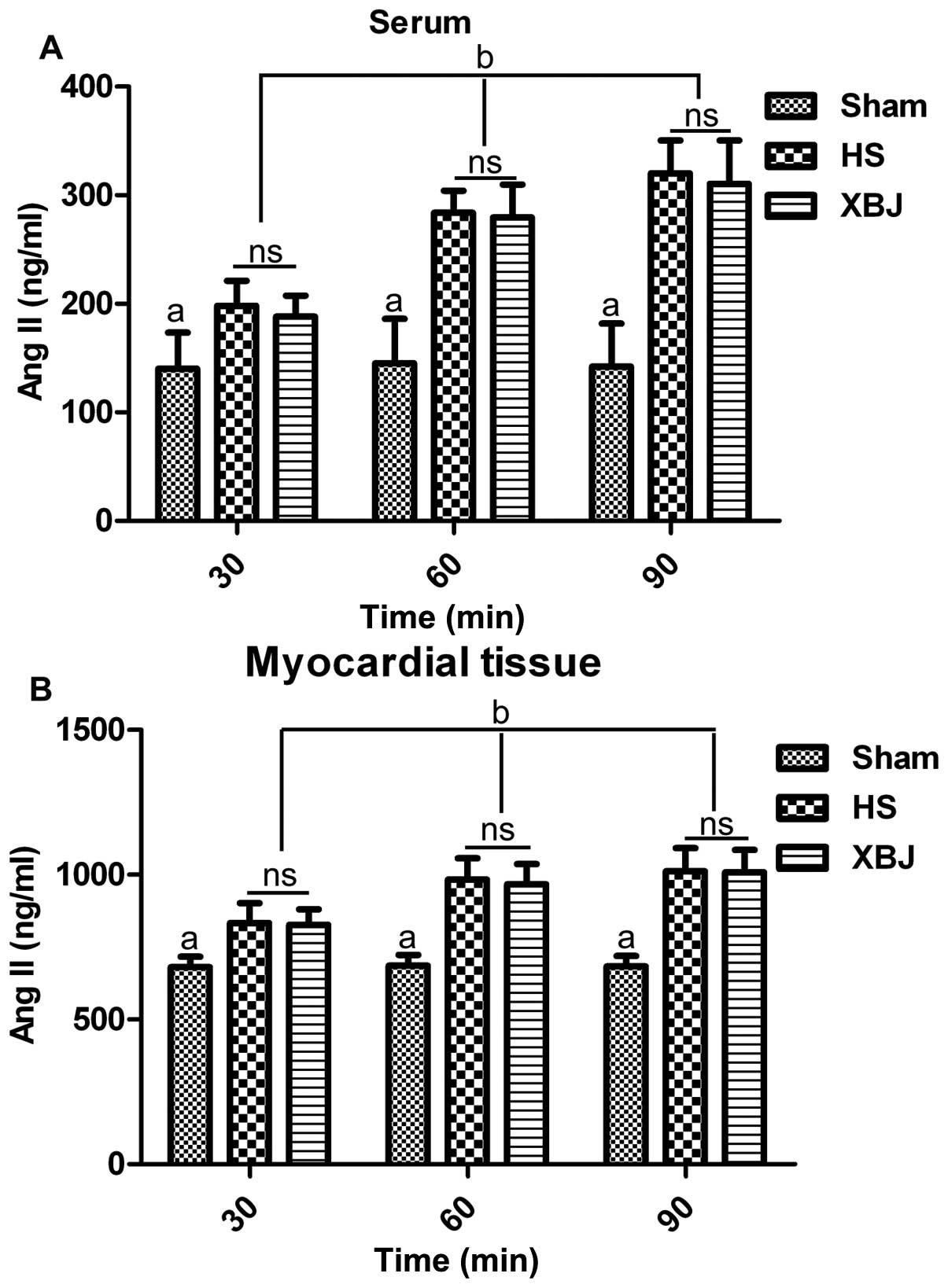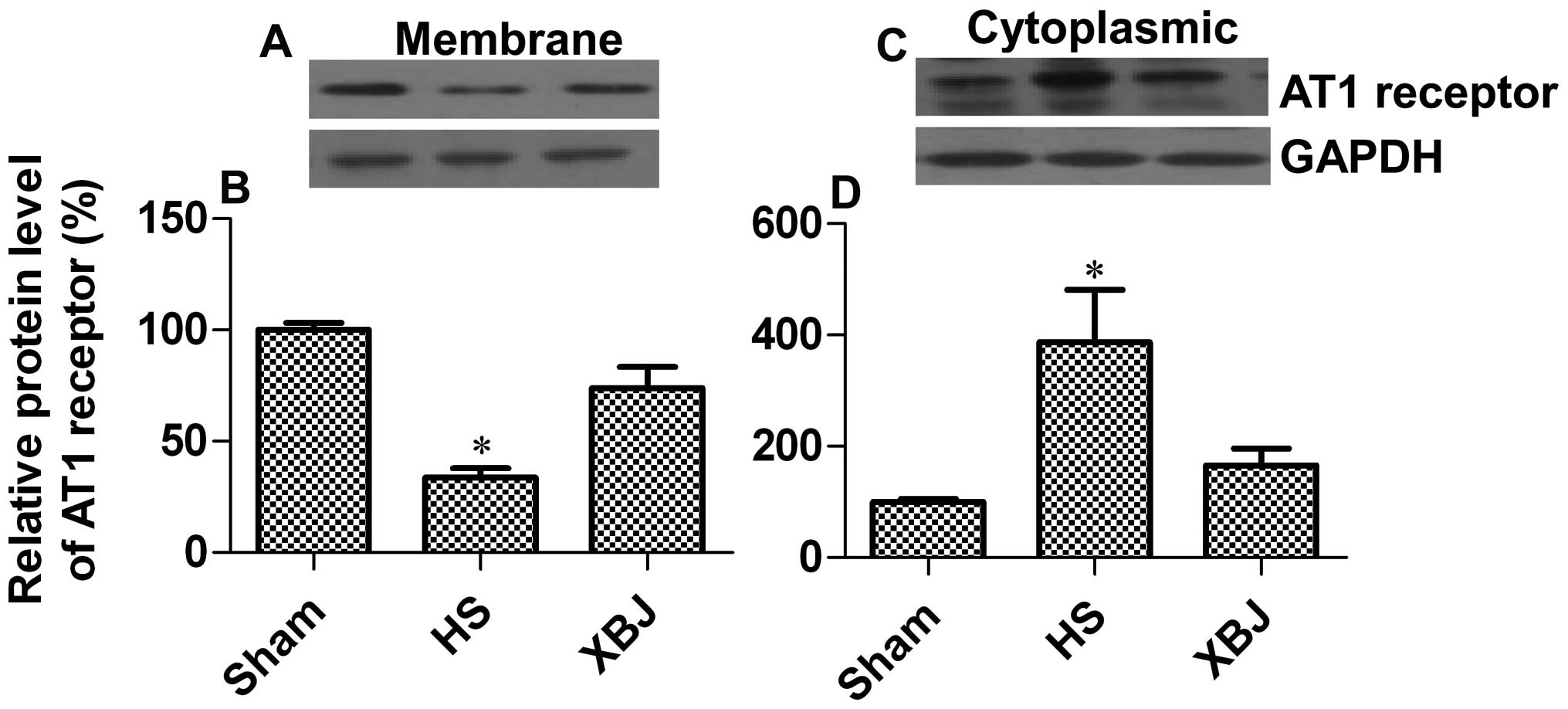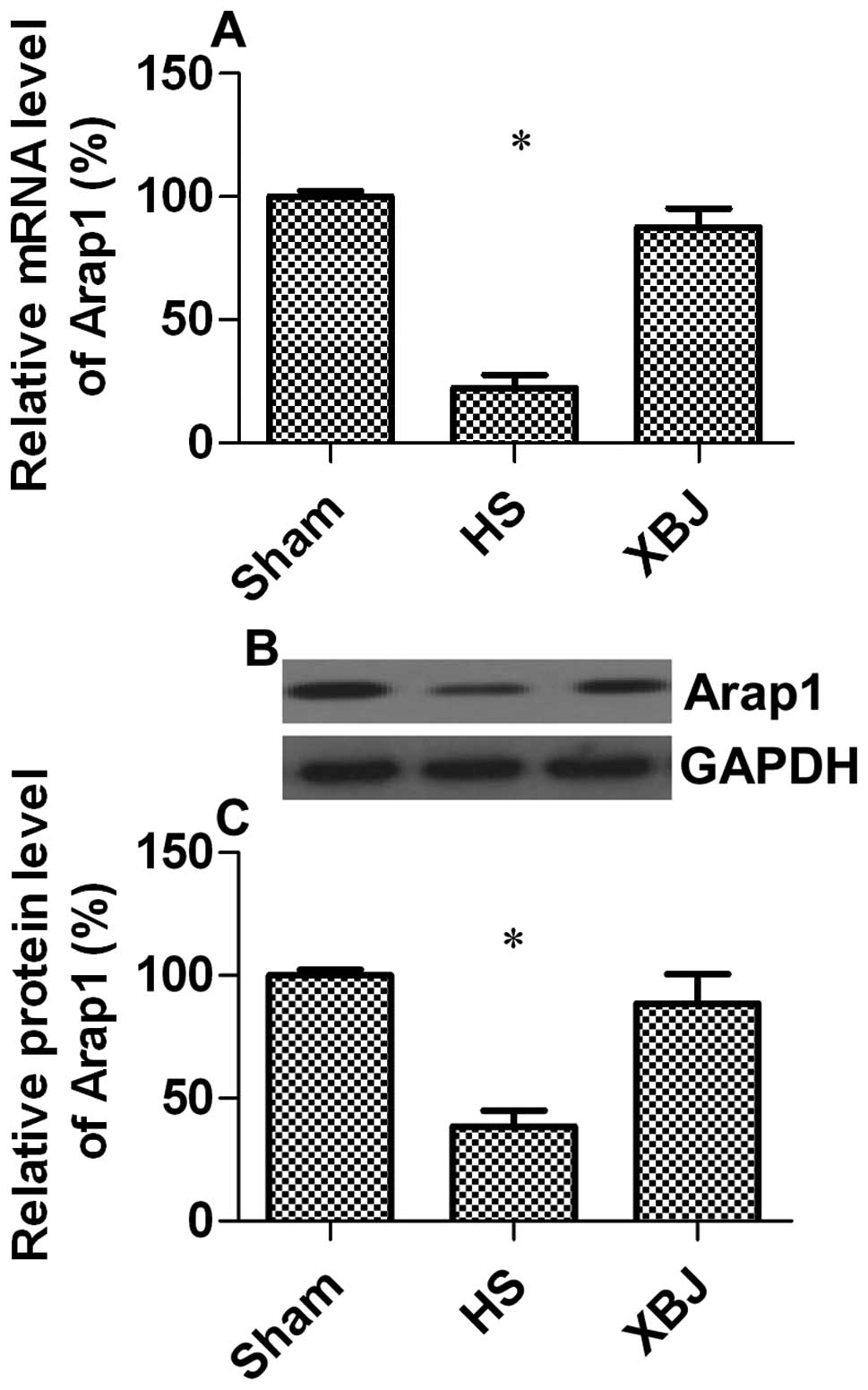|
1
|
Knochel JP: Disorders due to heat and
cold. Textbook of Medicine. Wyngaarden JB and Smith LH: Saunders;
Philadelphia: pp. 2304–2306. 1985
|
|
2
|
Semenza JC, Rubin CH, Falter KH, et al:
Heat-related deaths during the July 1995 heat wave in Chicago. N
Engl J Med. 335:84–90. 1996. View Article : Google Scholar : PubMed/NCBI
|
|
3
|
Robine JM, Cheung SL, Le Roy S, et al:
Death toll exceeded 70,000 in Europe during the summer of 2003. C R
Biol. 331:171–178. 2008. View Article : Google Scholar : PubMed/NCBI
|
|
4
|
Leon LR, Blaha MD and DuBose DA: Time
course of cytokine, corticosterone, and tissue injury responses in
mice during heat strain recovery. J Appl Physiol (1985).
100:1400–1409. 2006. View Article : Google Scholar : PubMed/NCBI
|
|
5
|
Lu KC, Wang JY, Lin SH, Chu P and Lin YF:
Role of circulating cytokines and chemokines in exertional
heatstroke. Crit Care Med. 32:399–403. 2004. View Article : Google Scholar : PubMed/NCBI
|
|
6
|
Bouchama A, Ollivier V, Roberts G, et al:
Experimental heatstroke in baboon: analysis of the systemic
inflammatory response. Shock. 24:332–335. 2005. View Article : Google Scholar : PubMed/NCBI
|
|
7
|
Bouchama A, Hammami MM, Al Shail E and De
Vol E: Differential effects of in vitro and in vivo hyperthermia on
the production of interleukin-10. Intensive Care Med. 26:1646–1651.
2000. View Article : Google Scholar : PubMed/NCBI
|
|
8
|
Bouchama A, al-Sedairy S, Siddiqui S,
Shail E and Rezeig M: Elevated pyrogenic cytokines in heatstroke.
Chest. 104:1498–1502. 1993. View Article : Google Scholar : PubMed/NCBI
|
|
9
|
Hammami MM, Bouchama A, Al-Sedairy S, et
al: Concentrations of soluble tumor necrosis factor and
interleukin-6 receptors in heatstroke and heatstress. Crit Care
Med. 25:1314–1319. 1997. View Article : Google Scholar : PubMed/NCBI
|
|
10
|
Hashim IA, Al-Zeer A, Al-Shohaib S,
Al-Ahwal M and Shenkin A: Cytokine changes in patients with
heatstroke during pilgrimage to Makkah. Mediators Inflamm.
6:135–139. 1997. View Article : Google Scholar : PubMed/NCBI
|
|
11
|
Bouchama A and Knochel JP: Heat stroke. N
Engl J Med. 346:1978–1988. 2002. View Article : Google Scholar
|
|
12
|
Bouchama A, Roberts G, Al Mohanna F, et
al: Inflammatory, hemostatic, and clinical changes in a baboon
experimental model for heatstroke. J Appl Physiol (1985).
98:697–705. 2005. View Article : Google Scholar : PubMed/NCBI
|
|
13
|
Lin MT, Kao TY, Jin YT and Chen CF:
Interleukin-1 receptor antagonist attenuates the heat
stroke-induced neuronal damage by reducing the cerebral ischemia in
rats. Brain Res Bull. 37:595–598. 1995. View Article : Google Scholar : PubMed/NCBI
|
|
14
|
Lin MT, Liu HH and Yang YL: Involvement of
interleukin-1 receptor mechanisms in development of arterial
hypotension in rat heatstroke. Am J Physiol. 273:H2072–H2077.
1997.PubMed/NCBI
|
|
15
|
Cumming AD, Driedger AA, McDonald JW, et
al: Vasoactive hormones in the renal response to systemic sepsis.
Am J Kidney Dis. 11:23–32. 1988. View Article : Google Scholar : PubMed/NCBI
|
|
16
|
Hilgenfeldt U, Kienapfel G, Kellermann W,
Schott R and Schmidt M: Renin-angiotensin system in sepsis. Clin
Exp Hypertens A. 9:1493–1504. 1987. View Article : Google Scholar
|
|
17
|
Benedict CR and Rose JA: Arterial
norepinephrine changes in patients with septic shock. Circ Shock.
38:165–172. 1992.PubMed/NCBI
|
|
18
|
Castrop H: Angiotensin receptor-associated
proteins: local modulators of the renin-angiotensin system.
Pflugers Arch. 465:111–119. 2013. View Article : Google Scholar : PubMed/NCBI
|
|
19
|
Kai H, Griendling KK, Lassègue B, et al:
Agonist-induced phosphorylation of the vascular type 1 angiotensin
II receptor. Hypertension. 24:523–527. 1994. View Article : Google Scholar : PubMed/NCBI
|
|
20
|
Guo DF, Chenier I, Tardif V, Orlov SN and
Inagami T: Type 1 angiotensin II receptor-associated protein ARAP1
binds and recycles the receptor to the plasma membrane. Biochem
Biophys Res Commun. 310:1254–1265. 2003. View Article : Google Scholar : PubMed/NCBI
|
|
21
|
Doblinger E, Höcherl K, Mederle K, et al:
Angiotensin AT1 receptor-associated protein Arap1 in the kidney
vasculature is suppressed by angiotensin II. Am J Physiol Renal
Physiol. 302:F1313–F1324. 2012. View Article : Google Scholar : PubMed/NCBI
|
|
22
|
Mederle K, Schweda F, Kattler V, et al:
The angiotensin II AT1 receptor-associated protein Arap1 is
involved in sepsis-induced hypotension. Crit Care. 17:R1302013.
View Article : Google Scholar : PubMed/NCBI
|
|
23
|
Chen Y, Tong H, Zhang X, et al: Xuebijing
injection alleviates liver injury by inhibiting secretory function
of Kupffer cells in heat stroke rats. J Tradit Chin Med.
33:243–249. 2013. View Article : Google Scholar : PubMed/NCBI
|
|
24
|
Jiang M, Zhou M, Han Y, et al:
Identification of NF-κB inhibitors in Xuebijing injection for
sepsis treatment based on bioactivity-integrated UPLC-Q/TOF. J
Ethnopharmacol. 147:426–433. 2013.
|
|
25
|
Chen SH, Chang FM, Niu KC, Lin MY and Lin
MT: Resuscitation from experimental heatstroke by estrogen therapy.
Crit Care Med. 34:1113–1118. 2006. View Article : Google Scholar : PubMed/NCBI
|
|
26
|
Chen CM, Hou CC, Cheng KC, et al:
Activated protein C therapy in a rat heat stroke model. Crit Care
Med. 34:1960–1966. 2006. View Article : Google Scholar : PubMed/NCBI
|
|
27
|
Livak KJ and Schmittgen TD: Analysis of
relative gene expression data using real-time quantitative PCR and
the 2(-Delta Delta (CT)) method. Methods. 25:402–408. 2001.
View Article : Google Scholar : PubMed/NCBI
|
|
28
|
Ohtani R, Ohashi Y, Muranaga K, Itoh N and
Okamoto H: Changes in activity of the renin-angiotensin system of
the rat by induction of acute inflammation. Life Sci. 44:237–241.
1989. View Article : Google Scholar : PubMed/NCBI
|
|
29
|
Rodriguez-Fernandez M, Grosman B,
Yuraszeck TM, et al: Modeling the intra- and extracellular cytokine
signaling pathway under heat stroke in the liver. PLoS One.
8:e733932013. View Article : Google Scholar : PubMed/NCBI
|
|
30
|
Gilmore TD: Introduction to NF-kappaB:
players, pathways, perspectives. Oncogene. 25:6680–6684. 2006.
View Article : Google Scholar : PubMed/NCBI
|
|
31
|
Watanabe T, Miyoshi M and Imoto T:
Angiotensin II: its effects on fever and hypothermia in systemic
inflammation. Front Biosci. 9:438–447. 2004. View Article : Google Scholar : PubMed/NCBI
|
|
32
|
Paradis P, Dali-Youcef N, Paradis FW,
Thibault G and Nemer M: Overexpression of angiotensin II type I
receptor in cardiomyocytes induces cardiac hypertrophy and
remodeling. Proc Natl Acad Sci USA. 97:931–936. 2000. View Article : Google Scholar : PubMed/NCBI
|
|
33
|
Hall JE: Control of sodium excretion by
angiotensin II: intrarenal mechanisms and blood pressure
regulation. Am J Physiol. 250:R960–R972. 1986.PubMed/NCBI
|
|
34
|
Hall JE and Granger JP: Adenosine alters
glomerular filtration control by angiotensin II. Am J Physiol.
250:F917–F923. 1986.PubMed/NCBI
|
|
35
|
Hunyady L, Catt KJ, Clark AJ and Gáborik
Z: Mechanisms and functions of AT(1) angiotensin receptor
internalization. Regul Pept. 91:29–44. 2000. View Article : Google Scholar : PubMed/NCBI
|
|
36
|
Gaborik Z, Szaszák M, Szidonya L, et al:
Beta-arrestin- and dynamin-dependent endocytosis of the AT1
angiotensin receptor. Mol Pharmacol. 59:239–247. 2001.PubMed/NCBI
|
|
37
|
Perry SJ and Lefkowitz RJ: Arresting
developments in heptahelical receptor signaling and regulation.
Trends Cell Biol. 12:130–138. 2002. View Article : Google Scholar : PubMed/NCBI
|
|
38
|
Tohgo A, Pierce KL, Choy EW, Lefkowitz RJ
and Luttrell LM: beta-Arrestin scaffolding of the ERK cascade
enhances cytosolic ERK activity but inhibits ERK-mediated
transcription following angiotensin AT1a receptor stimulation. J
Biol Chem. 277:9429–9436. 2002. View Article : Google Scholar : PubMed/NCBI
|
|
39
|
Smith RD, Baukal AJ, Zolyomi A, et al:
Agonist-induced phosphorylation of the endogenous AT1 angiotensin
receptor in bovine adrenal glomerulosa cells. Mol Endocrinol.
12:634–644. 1998. View Article : Google Scholar : PubMed/NCBI
|
|
40
|
Smith RD, Hunyady L, Olivares-Reyes JA, et
al: Agonist-induced phosphorylation of the angiotensin AT1a
receptor is localized to a serine/threonine-rich region of its
cytoplasmic tail. Mol Pharmacol. 54:935–941. 1998.PubMed/NCBI
|
|
41
|
Conchon S, Peltier N, Corvol P and Clauser
E: A noninternalized nondesensitized truncated AT1A receptor
transduces an amplified ANG II signal. Am J Physiol. 274:E336–E345.
1998.PubMed/NCBI
|
|
42
|
Hunyady L, Bor M, Balla T and Catt KJ:
Identification of a cytoplasmic Ser-Thr-Leu motif that determines
agonist-induced internalization of the AT1 angiotensin receptor. J
Biol Chem. 269:31378–31382. 1994.PubMed/NCBI
|
|
43
|
Tang H, Guo DF, Porter JP, Wanaka Y and
Inagami T: Role of cytoplasmic tail of the type 1A angiotensin II
receptor in agonist- and phorbol ester-induced desensitization.
Circ Res. 82:523–531. 1998. View Article : Google Scholar : PubMed/NCBI
|
|
44
|
Hagiwara S, Iwasaka H, Matumoto S, Hidaka
S and Noguchi T: Effects of an angiotensin-converting enzyme
inhibitor on the inflammatory response in in vivo and in vitro
models. Crit Care Med. 37:626–633. 2009. View Article : Google Scholar : PubMed/NCBI
|
|
45
|
Ghosh S and Hayden MS: New regulators of
NF-kappaB in inflammation. Nat Rev Immunol. 8:837–848. 2008.
View Article : Google Scholar : PubMed/NCBI
|
|
46
|
Watters TM, Kenny EF and O’Neill LA:
Structure, function and regulation of the Toll/IL-1 receptor
adaptor proteins. Immunol Cell Biol. 85:411–419. 2007. View Article : Google Scholar : PubMed/NCBI
|
|
47
|
Li T: Avoiding adverse drug reactions to
Chinese medicine injections. J Evid Based Med. 3:44–49. 2010.
View Article : Google Scholar
|



















